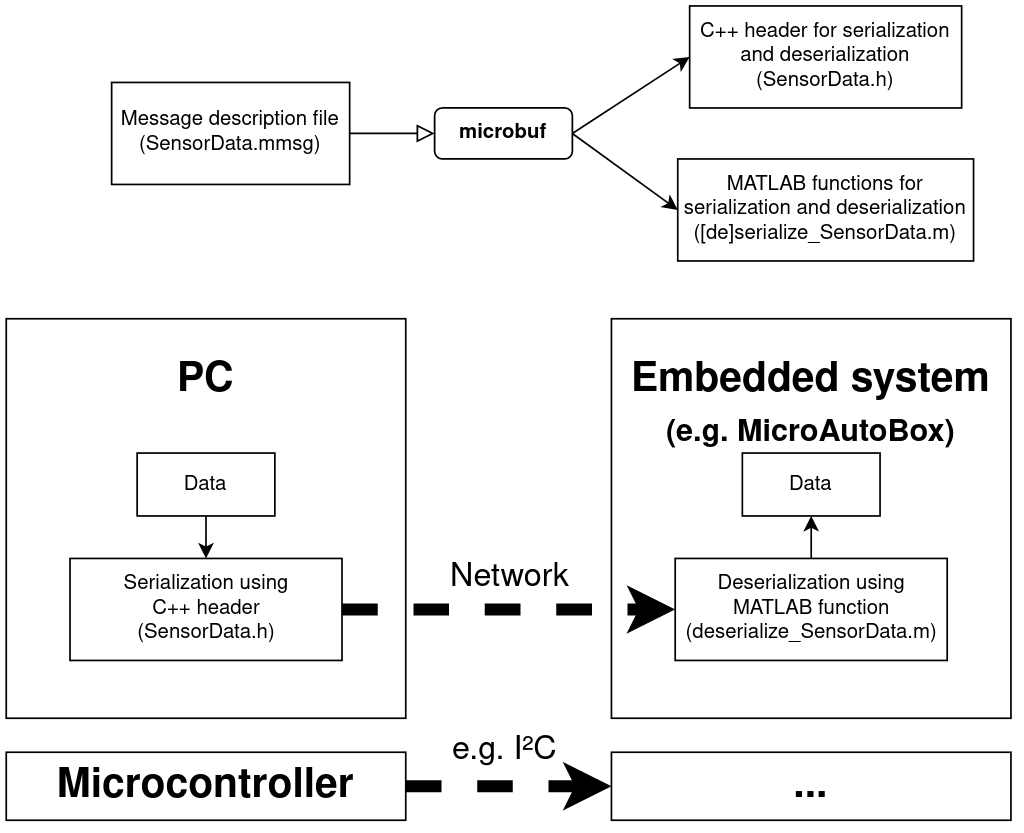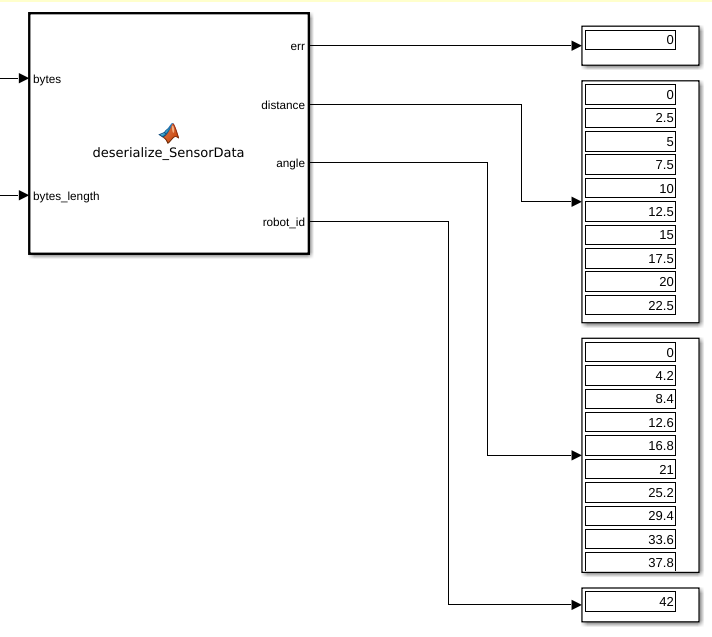Data serialization toolchain for computers and embedded systems with C++ or MATLAB support

microbuf?You might want to use it if you plan to create an interface between devices running a C++ application (a computer or embedded system) and/or devices running (possibly compiled) MATLAB code (Simulink on PC or embedded systems). One possible use case would be "Send control data from computer over UDP to embedded system". The currently supported languages are C++ and MATLAB, for both serialization and deserialization (Tx+Rx). This makes it possible to e.g. send data from a ROS node to a dSPACE MicroAutoBox, from an Arduino to a Simulink simulation on a PC, or exchange data between multiple Arduinos - without writing the interface code byte-by-byte or worrying about things like endianness. Support for more languages can be added with reasonable effort.
protobuf/JSON/matlab-msgpack/...?Using another framework with more features like protobuf may indeed make sense in many cases.
microbuf is intended for use cases with strong limitations, e.g. embedded systems or similar environments with a constrained toolchain.
microbuf does not depend on external libraries (or even functionality in the C++ std namespace) and a compilation just using standard language tools is possible.
matlab-msgpack by bastibe cannot be compiled to C code with Simulink/MATLAB coder.
The following data types are currently supported:
booluint8, uint16, uint32, and uint64float32, float64| Language | Serialization | Deserialization | CRC support | Examples | Notes |
|---|---|---|---|---|---|
| C++ | ✔ | ✔ | ✔ | ROS node; C++ application; Arduino sketch | |
| MATLAB | ✔ | ✔ | ✔ | dSPACE MicroAutoBox; Simulink simulation | Usable in Simulink; compiles with Simulink/MATLAB Coder |
| ... | ✘ | ✘ | ✘ | Please open a feature request or PR for new target languages |
microbuf uses message description files ending with .mmsg for describing the structure
of messages, not unlike ROS.
mmsg files need to follow a specific structure and must be valid YAML.
The following example can be saved as SensorData.mmsg and then be used as a microbuf message:
version: 1
append_checksum: yes
content:
distance: float32[10]
angle: float32[10]
robot_id: uint8More examples can be found under test/messages/.
When you now execute ./microbuf.py SensorData.mmsg, serializers and deserializers for the supported languages will automatically be generated.
You can use the serializers to convert data to bytes, send them to your receiver (e.g. via UDP or I2C), and decode them there with the deserializers.
microbuf's serialization is based on the
MessagePack specification.
All data elements are packed into a flat array and an optional CRC16 checksum is appended.
git clone https://github.com/nspo/microbuf.git
cd microbufpyyaml at the time of writing) are installed:
sudo apt install python3-yamlpip: pip3 install -r requirements.txtmicrobuf with the example message: ./microbuf.py SensorData.mmsggit submodule update --init --recursiveSuppose you want to send the message SensorData.mmsg mentioned above from a computer (using C++) to a Simulink simulation.
microbuf will generate a header file SensorData.h which you can include in your C++ code.
This message header file needs access to the microbuf.h header file, so just copy both files to the same folder where your compiler will find them or adapt your CMakeLists.txt.
You can then use the struct SensorData_struct_t in C++ to fill in your data and convert them to a byte vector, e.g. like this:
SensorData_struct_t sensor_data {};
// fill example data into SensorData msg
for(size_t i=0; i<10; ++i)
{
sensor_data.distance[i] = 2.5*static_cast<float>(i);
sensor_data.angle[i] = 4.2*static_cast<float>(i);
}
sensor_data.robot_id = 42U;
const auto bytes = sensor_data.as_bytes(); // convert to bytesbytes now needs to be sent to the receiver system somehow, e.g. via UDP.
The examples folder contains an example how one could do it.
The Simulink simulation can be configured to receive the serialized bytes.
This can be achieved e.g. with the UDP Receive block from the DSP System Toolbox.
By adding the file deserialize_SensorData.m which microbuf generated to the Simulink model, you can then easily deserialize the received data:

Note that in order to simulate or compile such a model, the matlab folder of microbuf needs to be on your MATLAB path because it contains necessary functionality which is not included in deserialize_SensorData.m.
You can of course also just copy the contained +microbuf folder to a place in your project which is on your MATLAB path anyway.
The examples folder also contains the full Simulink model.
In the same file you will also find a commented out example using MATLAB to serialize data.
Largely the same things need to done for this example as for the previous one. The code can mostly be reused. You need to include the necessary C++ code in your ROS node and think about when you want to send a message to the MicroAutoBox (e.g. with which rate).
On the MicroAutoBox side, you cannot use the same UDP Receive block because you need a hardware-specific one. A similar UDP Receive block is included in the RTI Ethernet (UDP) Blockset though, so you can use that one instead. Note that the maximum payload of UDP packets for this blockset is 1472 bytes, according to the documentation. The deserialization function can be included as in the previous example and will be compiled to C code automatically.
The headers which microbuf generates can easily be included in an Arduino sketch.
The code compiles as it does not require functionality from the std namespace.
Possibly dependant on your specific Arduino hardware, float64 data can probably not be serialized on the Arduino as doubles may only have 32 bits. When using the Wire (I2C) library, only 32 bytes can be transmitted in one step.
One example of sending data from one Arduino to another via I2C can be found here.

microbuf knows the required number of bytes, see e.g. the constant data_size of the generated C++ struct. Known limits: